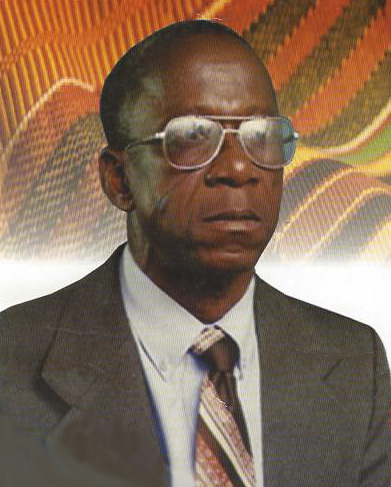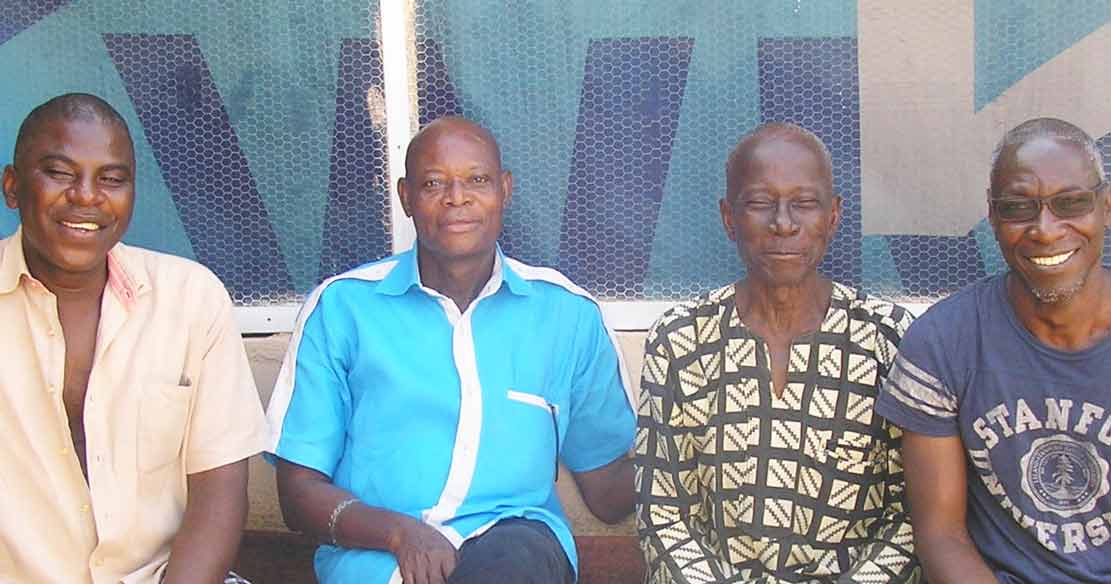
Rev. James Agalic
(From his Burial and Thanksgiving Service booklet)
Ghanatta Ayaric
Rev. James Agalic (1942-2014)
 |
|
Rev. James Agalic (From his Burial and Thanksgiving Service booklet) |
I have known Reverend Agalic since my teenage years in Buluk in the early 1970s. It was impossible for anyone living in a small town like Sandema not to know the Presbyterian priest. He was the first Bulsa pastor of the Church’s parish in Sandema, the second biggest Christian mission in Bulsa after Wiaga Catholic Mission, and one of the very few people in Buluk who used a motorbike.
Some years later, towards the end of the 1970s, I was privileged to be his mate at the University of Cape-Coast. In fact, it was Pastor Agalic (and my friends and I affectionately called him Revi) who helped me to regulate the bureaucratic formalities regarding my admission and residence at the university. It was clear from our dealings with people in that connection that he was a respected and popular member of the university community. From the Registrar’s office to the porter’s lodge, Revi was always warmly received and listened to. It eased and hastened my registration and residential status.
In 1976 the Institute of Ethnology (University of Münster, Germany) invited Rev. Agalic for a half-year-stay funded by the Deutsche Forschungsgemeinschaft (German Research Fund). In Münster he helped Prof. Schott edit the first volume of the Bulsa Sunsuelima (Folktales of the Bulsa), in Lippstadt he assisted Dr. Franz Kröger in editing the first Buli-English Dictionary. During this time he also launched his first own publication "Story-Telling among the Bulsa of Northern Ghana.” (see bibliography below). In 1990 and 1993 Rev. Agalic visited Münster, Lippstadt and other German towns again.
From his first trip to Germany he brought a red Volkswagen (VW) beetle car which became more or less a community car on Cape Coast campus. He used it to run errands not only for friends but for the representative council of his hall of residence as well as the Northern Students Union and Students Representative Council! And for many students of Northern origin, he was the senior brother from whom they sought advice in various contexts.
After his Bachelor Degree Studies in Cape Coast, Pastor Agalic continued to the University of
Ghana, Legon to do a Master’s Degree in African Studies and worked as a research assistant
for Bulsa surveys at the Institute of African Studies as well. I had also begun my national
service at Presbyterian Boys’ Secondary School, (Presec) and being in the same area we
maintained the close contact we had established in Cape Coast. The early 1980s were
turbulent; politically, socially and economically. Just when the country was about to be
acknowledged as politically stable by the international community after the events of June 4th
1979, Flt. Lt. Jerry John Rawlings bounced back into the political landscape in a second coup
d’état on 31st December 1981. The next few years ushered in hard economic and social
conditions in Ghana. Food was scarce and life was generally hard.
Revi adopted his own pragmatic approach to the situation; he farmed the land around his home and grew his own foodstuffs; cassava, maize and different kinds of vegetables. He also raised fowls. On many of the occasions that I visited him (often in the company of friends, also Revi’s young friends: Kwame Agati, Pascal Ayaric, Martin Atuire, Stephen Syme, Francis Apanka or Sofo Ali-Akpajiak) in his South Legon home, he was out working on his farm. This inspired us to use the land around my bungalow at Presec for the same purpose and we were glad we followed his example. The yield supplied us with more food than we could afford to buy with the little money we earned or had!
|
|
|
The pastor as a war-dancer (photo by Dr. Barbara Meier) |
In June 1983, a group of teachers and pupils from the Reisende Werkschule Scholen (RWS) in Germany arrived in Accra on their way to Sandema to work on a development project that Rev. Agalic had initiated. It was called the Bulsa Youth Rehabilitation Project and sought to encourage young people who had migrated to the southern cities looking for work to return to Buluk. The project offered them employment in agriculture, carpentry and metal work.
I left Ghana towards the end of that year and was later to benefit from the contact with the RWS. After a few months working as a teacher in Libya and a short stay in the UK, the RWS invited me to join their staff as a guest teacher for three months. The guest teacher is now a Studienrat in the German school system and a German citizen, a status that has brought a lot of improvement in my life! I owe this humble achievement partly to Pastor Agalic. Without him I would not have had any contact with the RWS and would probably not have come to Germany at all. Between 1984 and 2000, the RWS invited other young Bulsa people to visit their school: Pontius, Pascal Ayaric, Lincoln Abakisi, Bismarck Abakisi and Greg Akanko are some of them. And in collaboration with James Agalic, the school also sponsored some development projects in Bulsa, among them a kindergarten in Sandema.
The highlight of my working visit at the RWS was when Revi visited the school in 1988. We had a lot of fun visiting sights in and around Bremen in the company of Pago Balke (the teacher of the RWS with whom we had the most contact) and reminiscing about our Cape Coast and Legon days.
Even though our contact after that was not very active, it was still rooted! Whenever I was in Ghana (Sandema) I visited him. On one such visit in 2009, he told me he had prostate cancer and that it was probably the last time I was seeing him. It was sad hearing that but I was optimistic he would overcome the disease. I met him in 2011 and again in 2012 at his Kalijiisa home in Sandema, and he looked healthier than when I saw him in 2009. Whoever has visited that house would give the man credit for his innovative environmentally-friendly ideas. With its abundance of shady trees and lush green vegetation, the fenced plot of land that is his home is a prototype of sustainability in ecological development in Buluk. The sounds of birds and insects reach the ear from the trees and bushes, and one sees different kinds of domestic animals and birds too; pigs, goats, rabbits, turkeys, ducks, fowls, and even an ostrich. The pond on the plot was once even home to a crocodile, he told me!
After the NPP had won the parliamentary and presidential elections of 2000, James Agalic was nominated District Chief Executive (DCE) of the Bulsa District, an office that he held from 2001 until 2005.
The reverend pastor was not only an ecological freak, but a scholar who wrote many useful papers on Bulsa Culture and Society. Pastor Agalic’s interest in and immense contribution to Bulsa history, culture and literature as shared passionately by Dr. Franz Kröger, Dr. Barbara Meier and the late Prof. Rüdiger Schott inspired me to join hands with Kröger in starting and establishing the only Bulsa journal currently, Buluk, Journal of Bulsa Culture and Society.
I was hoping to see Pastor Agalic again when I visit home in July this year, but that was not meant to be. Nonetheless, I will always cherish his memory as a senior brother, friend, an academician and a Bulsa whose vision for the development of our homeland opened doors of opportunity for me and many other Bulsa.
As editors of Buluk and personal friends of Pastor James Agalic, we, Franz Kröger and Ghanatta Ayaric, extend our condolences to his entire family in Sandema Kalijiisa and, above all, to Mrs. Agalic and his children: Phyllis, David, Durowaa, Richard, Stephen and Yvonne.
Revi, your life has impacted a lot of people in many positive ways. You did your best in all that was in your power to do! REST IN PEACE!
 |
|
From left to right: Pascal Ayaric, Norbert Awulley (former DCE), Rev. James Agalic, Ghanatta Ayaric |
James Agalic : Published and Unpublished Articles
1978 Story-Telling among the Bulsa of Northern Ghana, Zeitschrift für Ethnologie, 103, 2,
261-278.
1981 Sacrifice in Bulsa Traditional Religion, Dep. of Religious Studies, University of Cape Coast (B.A. examination paper; unpublished typescript, 104 pages).
1983 Buli Yam Saka Wamagisima. Proverbs of the Bulsa, Institute of African Studies, Legon (mimeo).
1983 Buli Sunsuelima (Yam Saka Sunsuelima), Institute of African Studies, Legon.
(twelve Bulsa stories written in Buli; mimeo).
1988 Bulsa Traditional Religion and Moral Values as Portrayed in Stories, Thesis presented in partial fulfilment of the requirements for the degree of Master of philosophy in African studies, Institute of African Studies, University of Ghana, Legon
(M.A. examination paper, 197 pages, unnpublished typescript).
2001 Positive Change in Bulsa, Buluk 2, 9-10
2002 (Editor) Builsa Wapaala, Builsa Newsletter (8 pages).